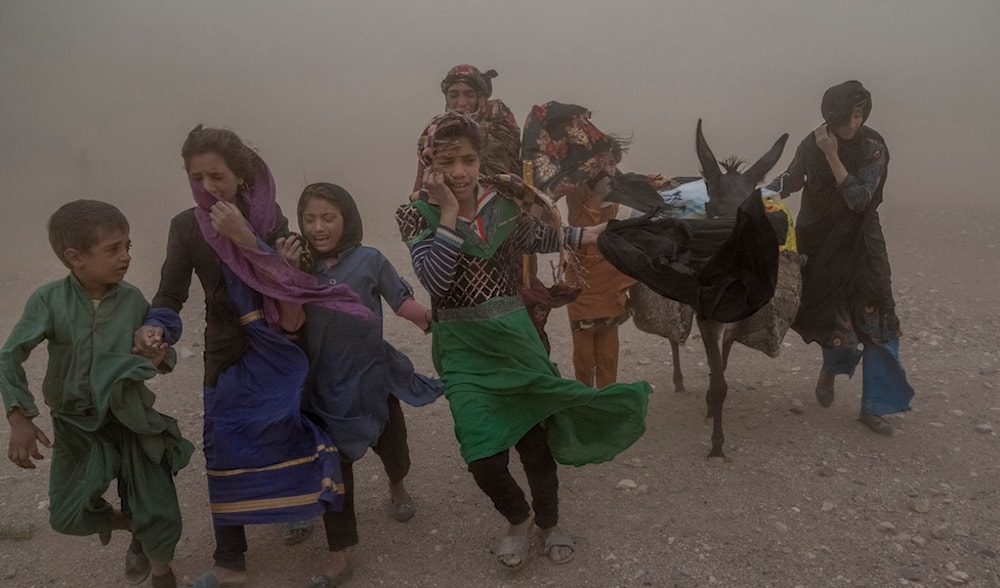UNICEF calls on Afghanistan to lift ban off girls' education
UNICEF has stressed that Afghan girls' right to education continues to be violated, yielding negative economic and societal consequences in the country.
-

Afghan girls carry donated aid to their tents, while they are scared and crying from the fierce sandstorm, after an earthquake in Zenda Jan district in Herat province, western Afghanistan, on Thursday, October 12, 2023. (AP)
UNICEF on Saturday called on Afghanistan's interim Taliban-led administration to lift the ban on girls' secondary education as the new academic year begins without them for the third consecutive year.
“For over three years, the rights of girls in Afghanistan have been violated. All girls must be allowed to return to school now. If these capable, bright young girls continue to be denied an education, then the repercussions will last for generations,” said UNICEF Executive Director Catherine Russell in a statement, stressing that "Afghanistan cannot leave half of its population behind."
As the new school term began on Thursday without girls beyond the sixth grade, Russell warned that if the restriction remains in place, more than 4 million girls will be unable to pursue education beyond primary school by 2030.
“The ban negatively impacts the health system, the economy, and the future of the nation. With fewer girls receiving an education, girls face a higher risk of child marriage with negative repercussions on their well-being and health," the statement added.
The ban also affects healthcare, as "girls and women will not receive the medical treatment and support they need" without educated female professionals, which could result in an additional 1,600 maternal deaths and over 3,500 infant deaths, it noted.
Despite the restrictions, UNICEF highlighted its efforts to provide education to 445,000 children through community-based learning, with girls making up 64% of the students.
“We urge the de facto authorities to lift this ban immediately. Education is not just a fundamental right; it is the pathway to a healthier, more stable, and prosperous society,” it added.
Taliban deputy foreign minister demands opening girls' high schools
In January, the Taliban's acting deputy foreign minister urged his senior leadership to establish schools for Afghan girls, in one of the sharpest public condemnations of a policy that has contributed to the authorities' worldwide isolation.
Sher Mohammad Abbas Stanekzai stated in a speech over the weekend that limits on girls and women's education were incompatible with Islamic Shariah law, requesting that "leaders of the Islamic Emirate to open the doors of education," according to Tolo, a local broadcaster.
He asserted that injustice was being done against "twenty million people, out of a forty million people population," and noted that "in the time of the Prophet Muhammad (Peace Be Upon Him), the doors of knowledge were open to both men and women."
The statements were among the harshest public criticisms of the school closures by a Taliban official in recent years. Taliban insiders and diplomats have previously told Reuters that the supreme spiritual leader Hibatullah Akhundzada imposed the closures despite internal dissent.
Read more: Taliban taking 'concrete steps' to 'free' women from oppression

 3 Min Read
3 Min Read








